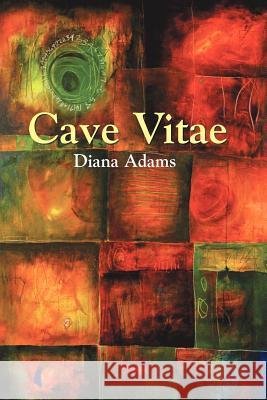Cave Vitae » książka
Cave Vitae
ISBN-13: 9781891386800 / Angielski / Miękka / 2007 / 108 str.
Narrative meets surrealism and feeling fires intellect in Cave Vitae a place where each poem gives off the fresh scent of the new. Adams understands the just-born image, can flush it out of hiding with one deft turn of a line, one twist of syntax, one startling phrase, and she delights in provoking intellect and emotion simultaneously. Here is where pure lyricism has gone, where it still lives, "in a city of intricate bricks beneath/centuries of water." Cave Vitae is cause for rejoicing.
Joan Houlihan, author of Hand-Held Executions and The Mending Worm.
"This is no penance, / to weave so fine a thread," Adams informs us, and indeed there is no trace of withholding in this young poet's theme, style, philosophy, and moreover, the breaking down of poetical barriers. Diana Adams is inventive and intelligent in her approach in Cave Vitae. These are beautifully haunting voices, I dare to say, similar to the best nature poets in America; and I am not shy to say, reminiscent of Robert Frost, for their musicality in the describing of nature and environment. The classical, the ancient, historical, and the presence of ghosts, work together in Adams' poetical anvil, and we stand with her, "at twilight we await the golden departure / knowing that we can stand on dry land."
Austin Clarke, The Polished Hoe, Winner of the 2003 Commonwealth Writers' Prize.
Diana Adams's vividly Ovidian poems are rife with transformations and metamorphoses. Ovid himself is found in exile, chipping a voice out of the grave: the poem lets us hear that voice again. A mailman on his rounds is Mercury, messenger of the gods; the hunter Actaeon is turned into a stag torn apart by his own hounds; a carpet takes in and keeps the history of its owner's heartbreaks. These rich, taut poems produce vibrant mythologies out of the world's profusion.
Reginald Shepherd, editor of The Iowa Anthology of New American Poetries, author of Fata Morgana.
Narrative meets surrealism and feeling fires intellect in Cave Vitae a place where each poem gives off the fresh scent of the new. Adams understands the just-born image, can flush it out of hiding with one deft turn of a line, one twist of syntax, one startling phrase, and she delights in provoking intellect and emotion simultaneously. Here is where pure lyricism has gone, where it still lives, "in a city of intricate bricks beneath/centuries of water." Cave Vitae is cause for rejoicing.
Joan Houlihan, author of Hand-Held Executions and The Mending Worm.
"This is no penance, / to weave so fine a thread", Adams informs us, and indeed there is no trace of withholding in this young poets theme, style, philosophy, and moreover, the breaking down of poetical barriers. Diana Adams is inventive and intelligent in her approach in Cave Vitae. These are beautifully haunting voices, I dare to say, similar to the best nature poets in America; and I am not shy to say, reminiscent of Robert Frost, for their musicality in the describing of nature and environment. The classical, the ancient, historical, and the presence of ghosts, work together in Adams poetical anvil, and we stand with her, "at twilight we await the golden departure / knowing that we can stand on dry land."
Austin Clarke, The Polished Hoe, Winner of the 2003 Commonwealth Writers Prize.
Diana Adamss vividly Ovidian poems are rife with transformations and metamorphoses. Ovid himself is found in exile, chipping a voice out of the grave: the poem lets us hear that voice again. A mailman on his rounds is Mercury, messenger of the gods; the hunter Actaeon is turned into a stag torn apart by his own hounds; a carpet takes in and keeps the history of its owners heartbreaks. These rich, taut poems produce vibrant mythologies out of the worlds profusion.
Reginald Shepherd, editor of The Iowa Anthology of New American Poetries, author of Fata Morgana.











